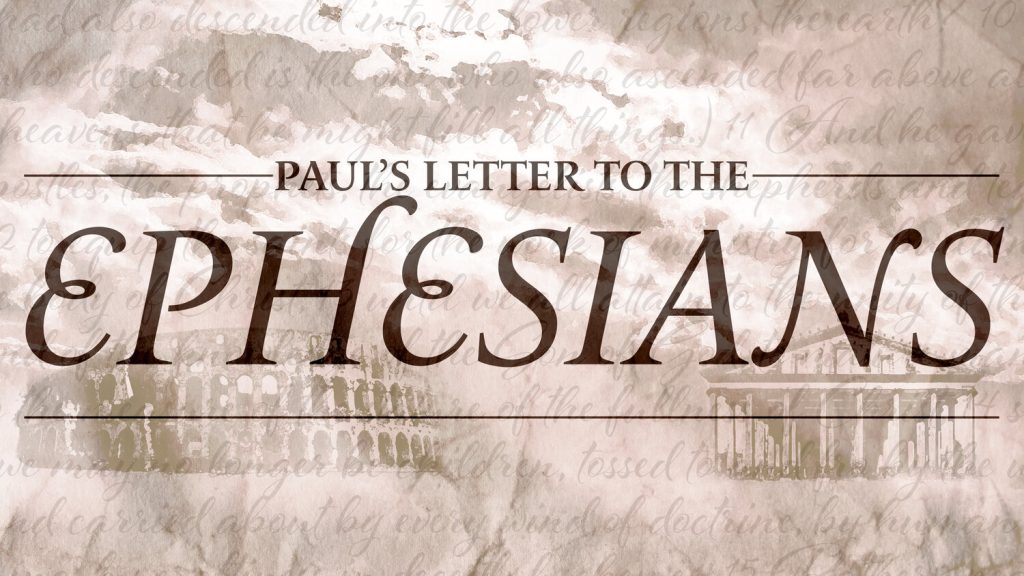This Tuesday, we will gather to begin our discussions of Ephesians. Please read Paul’s brief salutation and opening blessing of praise found in Ephesians 1:1-14.
The Heavenly Places: (v.3)
The first thanksgiving in Paul’s hymn of praise is our being blessed “with every spiritual blessing in the heavenly places.” v.3. Although “heaven” can mean “sky” (Gen. 1:15, 20) or God’s abode (Matt. 6:9), for Paul, it generally means the invisible, spiritual realm that is inhabited, not only by God but by angels and demons as well. See, Eph. 3:10, 6:12. As we have previously discussed in our study of Revelation, this heaven is the place of spiritual warfare between the forces of God/Good/Light and Satan/Darkness/Evil.
Also, for Paul, this invisible spiritual realm is more substantial than the visible physical world. Col. 2:17. Going back to Plato’s “Allegory of the Cave,” this world is only a shadow of the true reality. This is why Paul writes that the spiritual body (imperishable, glorious, and powerful) is resurrected, not the one of flesh and blood (perishable, dishonorable, and weak). 1 Cor. 15:50. Therefore, when Paul writes about the “heavenly places,” Paul is writing about the location of the true, substantial reality and not simply some ethereal, intangible plane of ghostly existence.
God’s Plan: (vv.3-10)
This opening hymn requires a deep understanding of the gospel message Paul brings. The question is not simply “How do I get into heaven?” Rather, the question is “How does God rescue his creation from sin and death?” Or rather “How is the victory of those forces arrayed against God obtained?” God’s plan (v.10) from the beginning of creation (v.4) is the incarnation, death, and resurrection of Jesus Christ. One of the practical implications of this message that Paul expands on in Ephesians is that separation from God and each other is death, and reconciliation with God and one another is a characteristic of Life. Therefore, the end result of God’s plan is the overthrowing of the powers of this world, and the uniting of all things in heaven and on earth in Christ Jesus. v.10. See, also, John 12:31-32, 1 Cor. 15:24-28, Phil. 2:10-11, Col. 1:13-20, Rev. 21. This is the story of the Scriptures.
God’s Assurance:
The focus of God’s plan is Jesus. It is Jesus whom God appointed from the beginning of time to defeat the powers and principalities of this world and to reconcile all creation to God and to each other. Paul wants his audience to understand that everything depends upon Christ Jesus and not us. Therefore, Paul intends this opening hymn to impart to us that blessed assurance that we who form the community that is Christ’s Body and Bride will reach that goal of reconciliation with God and one another within the new creation. We have been redeemed, we have been forgiven, and we have been lavished with God’s grace. v.7. Of this we are assured and there can be no doubt.
Dinner is at 6. The menu is chicken mole. Discussion about 6:45. Compline at 8. Hope to see you here!
The creation itself will be set free from its bondage to decay and obtain the glorious liberty of the children of God. We know that the whole creation has been groaning in travail together until now; and not only the creation, but we ourselves, who have the first fruits of the Spirit, groan inwardly as we wait for adoption as sons, the redemption of our bodies, for in this hope we are saved. Rom. 8:21-24


Pingback: Ephesians 4:1-7, A Life Worthy of Our Calling – Ancient Anglican
Pingback: Ephesians 3:7-13, Christ’s Benefits – Ancient Anglican